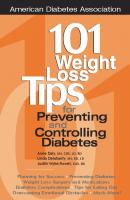101 Weight Loss Tips for Preventing and Controlling Diabetes. Anne Daly
Чтение книги онлайн.

Читать онлайн книгу 101 Weight Loss Tips for Preventing and Controlling Diabetes - Anne Daly страница 2
Название: 101 Weight Loss Tips for Preventing and Controlling Diabetes
Автор: Anne Daly
Издательство: Ingram
Жанр: Спорт, фитнес
Серия: 101 Tips Series
isbn: 9781580403948
isbn:
Too often people are just told to “lose weight.” Where do you begin? Is it worth the effort? Can you succeed? Yes, you can, and this book can help you do it. Any approach to losing weight needs to be simple and organized. We have found that it helps to expand your focus to four areas of your life: Weight, Activity, Variety, and Excess (WAVE). Yes, weight is the subject of this book, but the discussion must be about ways to increase activity and variety and to reduce excess in all areas. In other words, eat in moderation. Exercise in moderation. Feel stress in moderation. As for “why” you want to lose weight, it’s more than looking and feeling better. Losing weight can prevent health problems such as high blood pressure and diabetes. If you already have diabetes, weight loss can help you control it.
The Weight section of this book addresses the basics of losing weight and maintaining it, concerns if you have diabetes or are trying to keep from getting it, and surgery and medications for weight loss. The Activity section has three chapters on the basics, exercise and diabetes complications, and community changes to make being physically active easier. The Variety section has two chapters to help you plan for success and eating out. The Excess section talks about what to do when your environment is out of control, emotions, and roadblocks to success.
The WAVE concept was developed by the Practice and Patient Materials Committee from a consortium of 21 medical schools with Nutrition Academic Award funding. It is a useful way for health providers to work with you to achieve a healthier lifestyle and manage your weight.
| What are my health benefits if I lose weight? |
|
TIP:
If you lose weight, you can reduce your risk of getting diabetes, heart disease, high blood pressure, gall bladder disease, and breast and colon cancer. If you already have any of these health problems, losing weight improves them. When you lose weight, you’ll spend less time and money on doctor’s visits and health problems.
People who lose even small amounts of weight—5–7% of their starting weight (usually 10–20 pounds)—improve their health by reducing high blood pressure, high blood sugar, high cholesterol, sleep apnea, arthritis, and depression. And their self-esteem grows. Even without weight loss, you start getting health benefits just as soon as you take steps to improve your lifestyle with a meal plan and more physical activity. Just do it.
|
|
Which weight table should I use to find my healthy body weight? |
TIP:
Since being overweight is associated with increased risk of death, the life insurance industry has been making the public aware of it. The 1959 and 1983 Metropolitan Life Insurance Company tables of ideal body weight are still among the most popular in use, but they are very strict. In 1990, the federal government issued an updated table of suggested weights for adults based on height and age—the BMI table, which lists reasonable body weights. There is no ideal” body weight.
|
|
What is reasonable body weight? |
TIP:
Reasonable body weight is a term that appears in the 1994 Nutrition Recommendations for People with Diabetes. This is defined as the weight that you and your health care team agree that you can probably achieve and maintain for the rest of your life. This weight turns out to be very different from ideal body weight, but it does reduce your health risks. For instance, a female who is 5'5" tall has an ideal body weight on the outdated table of 120 lbs. In real life however, if her current weight is 220, a reasonable body weight for her might be 160 lbs.
| How do I know if I’m overweight or obese? |
|
TIP:
Overweight and obesity are related but do not mean the same thing. Overweight refers to an excess amount of body weight for your height that includes all tissues, such as fat, bone, muscle, and water. For example, a football player with a lot of muscle might weigh a lot but it isn’t fat that makes him weigh so much. Obesity refers to an excess of body fat. You can measure obesity using the body mass index (BMI) table.
|
|
How do I calculate my BMI? |
TIP:
Body mass index or BMI is a way to measure overweight or obesity based on weight and height.
BMI = weight in kilograms / height in meters2. To calculate your BMI, you need to know your height and your weight.
Your weight in pounds divided by 2.2 = your weight in kilograms.
For example, if you weigh 200 pounds, then you weigh 90.9 kilograms.
Your height in inches x 2.54 = your height in centimeters. Divide your height in centimeters by 100 to get your height in meters.
If you are 68 inches tall, then you are 172.7 centimeters or 1.727 meters tall.